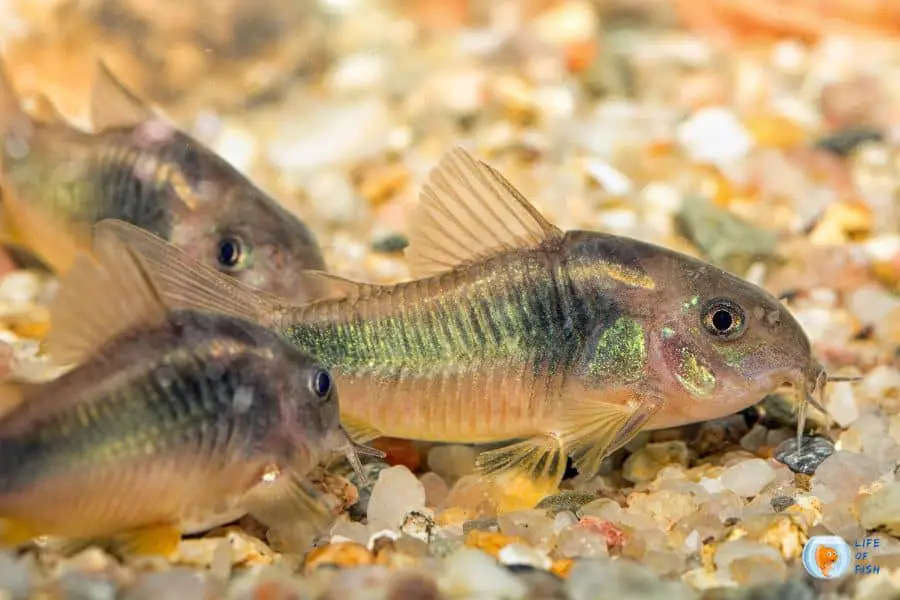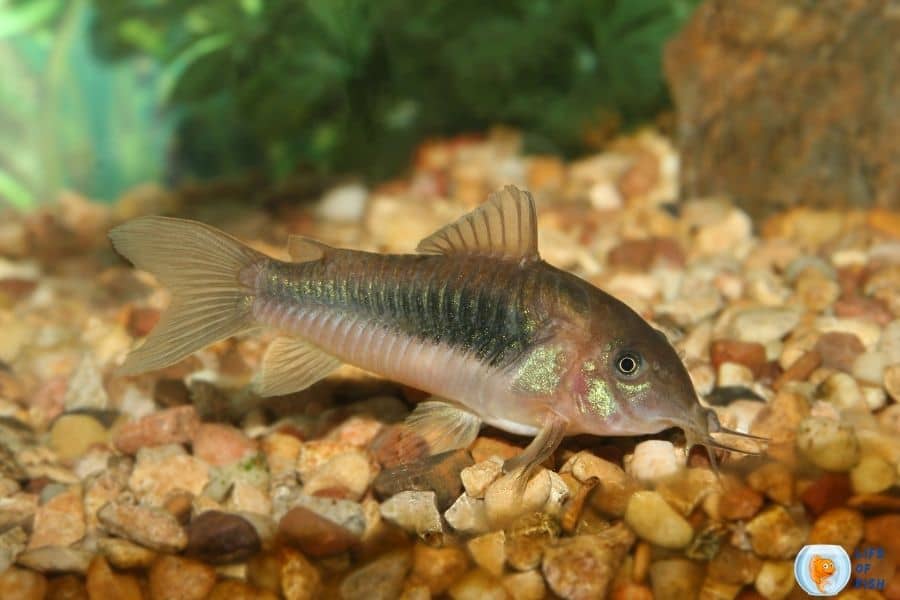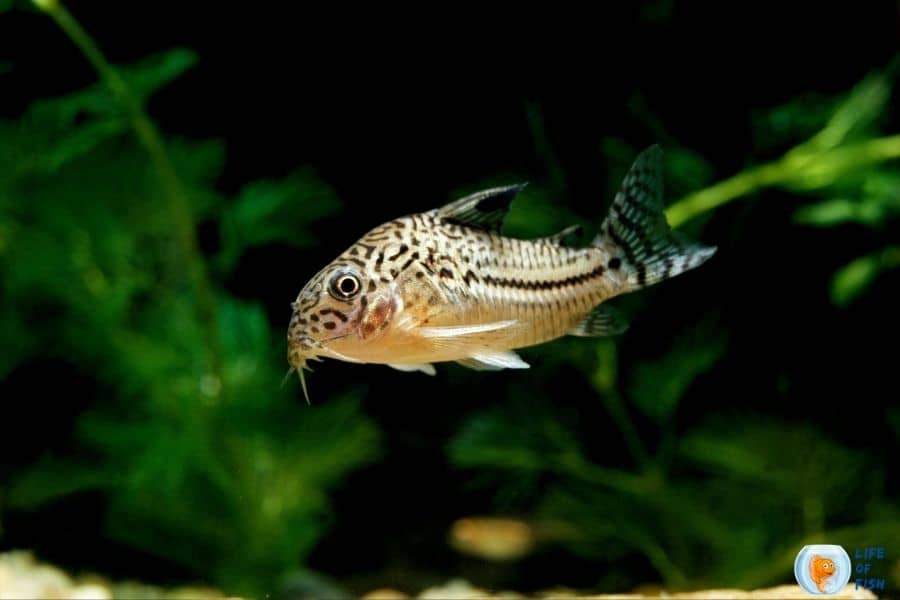As an aquarium hobbyist, you’ve likely seen odd behaviors emerge in your fish from time to time. One of the most perplexing is glass surfing in Corydoras Catfish – when fish frantically swim back and forth along the tank walls.

This unnatural behavior is especially common in corydoras catfish, who seem prone to sticking tight to the glass and compulsively pacing. While intriguing to watch, glass surfing signals that something is amiss in your cory’s environment.
By understanding the driving factors behind this abnormal activity, you can make simple tweaks to keep your cory cats happy and healthy. Let’s take a closer look at glass surfing!
Recognizing Common Glass Surfing Behaviors in Corydoras
Jump To
- 1 Recognizing Common Glass Surfing Behaviors in Corydoras
- 2 Underlying Causes of Glass Surfing in Cory Cats
- 3 Adjustments to Stop Glass Surfing in Corydoras
- 4 Tank Setup Tips to Prevent Glass Surfing in Corys
- 5 When to Worry About Corydoras Glass Surfing
- 6 Frequently Asked Questions About Corydoras Glass Surfing
- 7 Curbing Troubling Glass Surfing in Corydoras
Glass surfing describes when fish compulsively swim back and forth along the tank walls, typically at a fast pace. This behavior may manifest in corys as:
- Repeatedly pacing along the front tank wall
- Frantically darting up and down a corner of the tank
- Tracking along tank dividers or internal filters
- Flaring gills or panting while surfing the glass
Often the entire school will surf together, staying within an inch of the glass. This activity may persist for hours, and happens repeatedly day after day.
While many factors can cause glass surfing, the underlying drive is stress. Let’s examine why corydoras become stressed enough to display this abnormal reaction.
Underlying Causes of Glass Surfing in Cory Cats
Glass surfing signals that something in the cory’s environment is causing anxiety, discomfort, or distress. Some common reasons corydoras glass surf include:
Poor Water Quality
Deteriorating water conditions like high ammonia, nitrites, nitrates or pH swings can stress corydoras and trigger glass surfing. They are very sensitive to toxins.
Insufficient Oxygen
With high oxygen needs, poor aeration or surface agitation can make corys feel suffocated, frantically surfing for more air.
Crowding & Aggression
Too many corys in a small space leads to crowding stress. Aggression from territorial tankmates also causes anxiety.
Incorrect Water Parameters
Unsuitable water temperature, pH, hardness, or other factors outside of their natural range can lead corys to compulsively glass surf.
Bare & Bright Tank
Lack of hiding spots, plants, substrate, dim lighting, and other environmental comforts stresses corydoras in unnatural bare, bright tanks.
Vibrations
Nearby external rappings against the tank glass, or equipment vibrations from internal filters or powerheads may incite glass surfing.
Parasites
Heavy parasitic infections can spark glass surfing as corys scratch against surfaces for relief. Look for other symptoms like flashing.
By identifying and resolving the underlying problem, you can stop problematic glass surfing and restore your cory catfish to a healthy behavioral state.

Adjustments to Stop Glass Surfing in Corydoras
Once you pinpoint the root cause of your corydoras glass surfing, take targeted action to resolve it:
Improve Water Quality
Get ammonia, nitrites and nitrates to 0 ppm by testing frequently and performing partial water changes. Use activated carbon to filter toxins.
Increase Oxygenation
Boost surface agitation via hang-on-back filters and air stones. Reduce bioload through smaller feedings and cleaning.
Reduce Crowding & Aggression
Rehome excess corys to allow each inch of personal space. Move aggressive tankmates like cichlids into their own setup.
Adjust Water Parameters
Slowly transition to the ideal 70-80°F temperature and pH 6.5-7.5 range. Rule out chlorine, chloramines, and heavy metals.
Enrich the Tank Environment
Add more hideouts like caves, driftwood, and plants. Use darker substrate and dim lighting to mimic their natural habitat.
Dampen External Vibrations
Place tank away from windows, doors, or speakers. Move internal equipment to noise-absorbing foam.
Treat Parasitic Infections
Use parasite-eliminating medications like praziquantel to kill off any flukes, ich, etc. causing discomfort.
With a few simple adjustments tailored to the root problem, you can re-establish equilibrium and stop your cory shoal’s troubling glass surfing.
Tank Setup Tips to Prevent Glass Surfing in Corys
While fixing issues causing current glass surfing is important, optimizing your tank setup from the start can prevent problems before they begin:
- Provide 20+ gallon tanks to disperse aggression and dilute waste
- Include fine sand substrate and abundant hideouts like wood and rock caves
- Heavily plant the tank with live or silk plants offering safety
- Use subdued lighting close to their natural habitat
- Maintain stable water parameters in their ideal range
- Employ minimal water flow and surface disruption
- Feed a high quality varied diet to support health
- Use quarantine tanks and introduce new fish slowly
- Test water twice weekly and change at least 25% each week
Taking time up front to mimic corydoras natural habitat pays off by preventing the stress that compels abnormal glass surfing!

When to Worry About Corydoras Glass Surfing
Occasional short bursts of glass surfing during tank lighting changes or water parameter adjustments are normal. But consistent glass surfing signals an underlying issue.
Seek help from your exotic veterinarian or experienced aquarist if your corys show persistent glass surfing along with these concerning symptoms:
- Lethargy, loss of appetite, or hanging at the surface
- Appearing underweight or emaciated
- Heavy breathing and gulping at surface
- Clamped fins or frayed tail and barbels
- Skin lesions, growths, gold dusting or gray patches
- Hiding and avoiding contact with tankmates
Chronic glass surfing coupled with these signs can indicate deteriorating environmental conditions, disease, or extreme stress requiring intervention. Don’t delay – treat the root problem promptly.
Frequently Asked Questions About Corydoras Glass Surfing
Some common questions about glass surfing in cory catfish include:
Are corydoras nocturnal fish?
Yes – corys are most active at dawn and dusk in nature. But glass surfing at any time of day or night points to an underlying husbandry issue.
Why do corydoras swim at an angle or upside down?
Tilted swimming can indicate swim bladder disorder, which may be linked to poor water quality triggering glass surfing. Treat the root cause.
How can I add corydoras safely to my tank?
Use quarantine tanks for all new corys, gradually acclimate them to your water parameters, and avoid overcrowding to limit stress when adding them.
What corydoras species are most prone to glass surfing?
Green corys, sterbai corys, and pandas seem especially vulnerable to stress and anxiety, making them more likely glass surfers. But all cory species will exhibit the behavior if sufficiently distressed.
Can corys scratch tank glass by surfing?
It’s unlikely corydoras barbels can damage most glass. The exception is bare-bottomed rimless tanks, where long-term friction could scratch surfaces.
By understanding the nuances of this abnormal behavior, you can identify underlying problems and take the right steps to resolve glass surfing in your cory catfish.
Curbing Troubling Glass Surfing in Corydoras
While intriguing to observe, glass surfing in corydoras and other aquarium fish signals underlying issues. By identifying the root cause of stress and making targeted tank adjustments, you can curb glass surfing.
Optimizing your tank setup and maintenance routine from the start can also prevent problems down the road. Get to know your corydoras’ natural behaviors so you can recognize signs of distress like obsessive glass surfing before they escalate.
With attentive aquarium husbandry, you can help your cory catfish school live their very best fish lives! Let us know if you have any other questions about managing glass surfing behaviors in corys.
Best Substrate For Corydoras (You Must Know This)
Do Corydoras Eat Baby Platys? (They Won’t)
